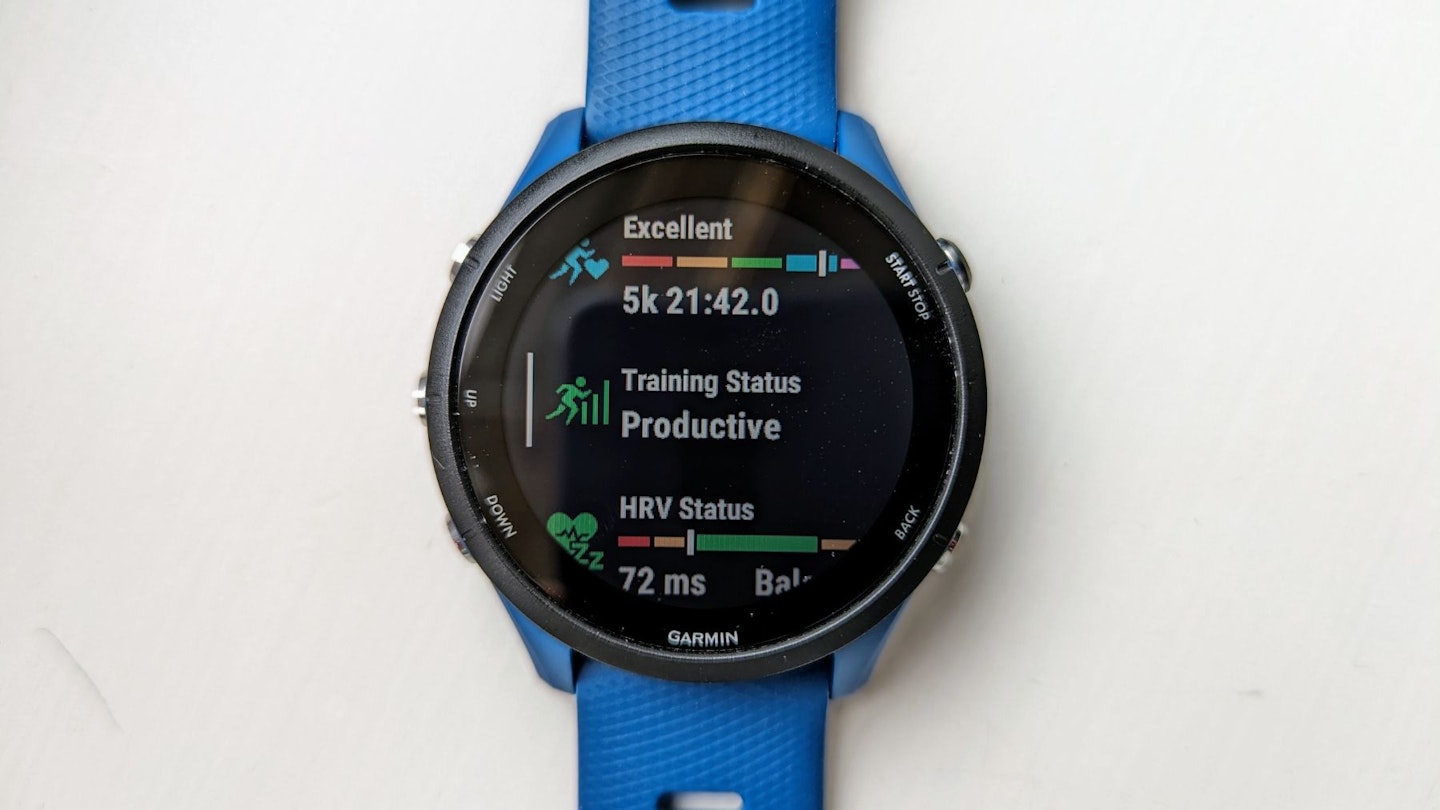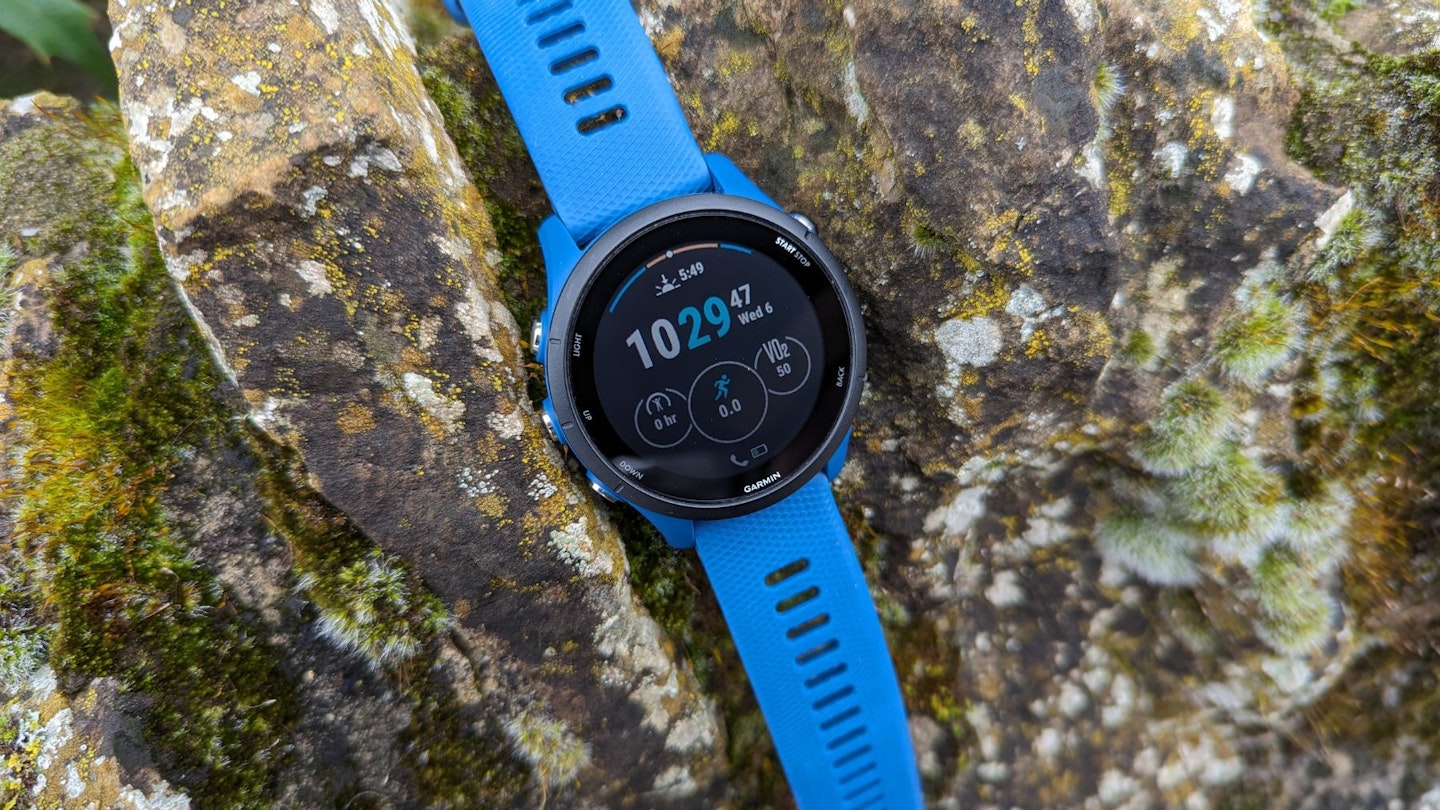You can use almost any modern smartwatch for tracking your health; but finding the best fitness tracker with GPS will help you to focus on your fitness as well. For anyone who wants to set a new PB, having a fitness tracker that can accurately track where you’ve gone, and how quickly, can make a significant difference in reaching your goals.
There are loads of fantastic devices with GPS built in. But, with so many great smartwatches and fitness trackers out there, it’s hard to know which ones are worth considering. The good news? We can help.
The best fitness tracker with GPS in 2024 at a glance
• Best overall fitness tracker with GPS: Garmin Forerunner 265 - View on John Lewis
• Best budget fitness tracker with GPS: Xiaomi Smart Band 8 Pro - View on Amazon
• Best Garmin fitness tracker with GPS: Garmin Venu 3 Smartwatch - View on Amazon
• Best Fitbit fitness tracker with GPS: Fitbit Charge 6 - View on Amazon
GPS has become an increasingly valuable tool for fitness trackers and smartwatches and is particularly useful for anyone who likes to go out for a walk, run or bike ride. But not all GPS is created equally. Connected GPS, for example, relies on the GPS in your mobile phone to track your location. But even that’s only part of the story.
We won’t get too bogged down in the details, but devices with built-in GPS can be quite varied. There are several global navigation satellite systems (GNSS), including GPS, GLONASS, Galileo, BeiDou and QZSS. Some fitness trackers will connect to one of these systems. Others might use more than one, and some may even use multiple different GNSS services at the same time, to get the most accurate location data possible.
So, with all that in mind, we’ve tracked down the best fitness trackers with GPS to suit almost any budget, and with a wealth of other features to make sure you can find the perfect device for your goals. If you want to get the most accurate tracking information about your exercise, look no further.
The best fitness trackers with GPS of 2024
All prices are correct at the time of writing. Prices, stock and deals are subject to change without notice.
Best overall fitness tracker with GPS
 Garmin
Garminwww.johnlewis.com
As one of the best Garmin watches, the Forerunner 265 earns its place at the top of the tree thanks to a blend of great health and fitness tracking features, and – crucially - top notch GPS. With multi-band support for GPS, GLONASS and Galileo GNSS systems, the Forerunner 265 also uses Garmin’s SatIQ technology to decide the best GPS mode to use depending on your environment. This means the watch can switch between different GPS modes to maximise battery life, without compromising accuracy.
As well as excellent GPS, the Forerunner 265 also has a brilliant AMOLED display, super battery life of up to 13 days, and access to a host of Garmin’s insights to help you get fitter and healthier. Body Battery, Morning Report, suggested workouts and training plans, plus training readiness and training status scores. Add in all the usual metrics – heart rate and heart rate variability, blood oxygen, sleep, steps and calories burn tracking, and you’ve got an all-round superstar.
It doesn’t offer the map support that you find on more expensive Garmin watches. And with an RRP of £429.99, it certainly isn’t the cheapest device on our shortlist. But it is not the most expensive either. And, its impressive package of features, coupled with the superb GPS it offers, make this tough to beat.
Pros
- Multi-band GPS and SatIQ tech for accurate location tracking
- Beautiful AMOLED display is easy to read
- More affordable than many Garmin watches
Cons
- Doesn't offer map support
| Display | 1.3-inch AMOLED, 416 x 416 pixels |
| Battery Life | Up to 13 days |
| GPS | GPS, GLONASS, GALILEO |
| Compatibility | iOS and Android |
| Water Resistance | 5 ATM |
| Dimensions | 46.1 x 46.1 x 12.9 mm |
| Weight | 47 grams |
Best budget fitness tracker with GPS
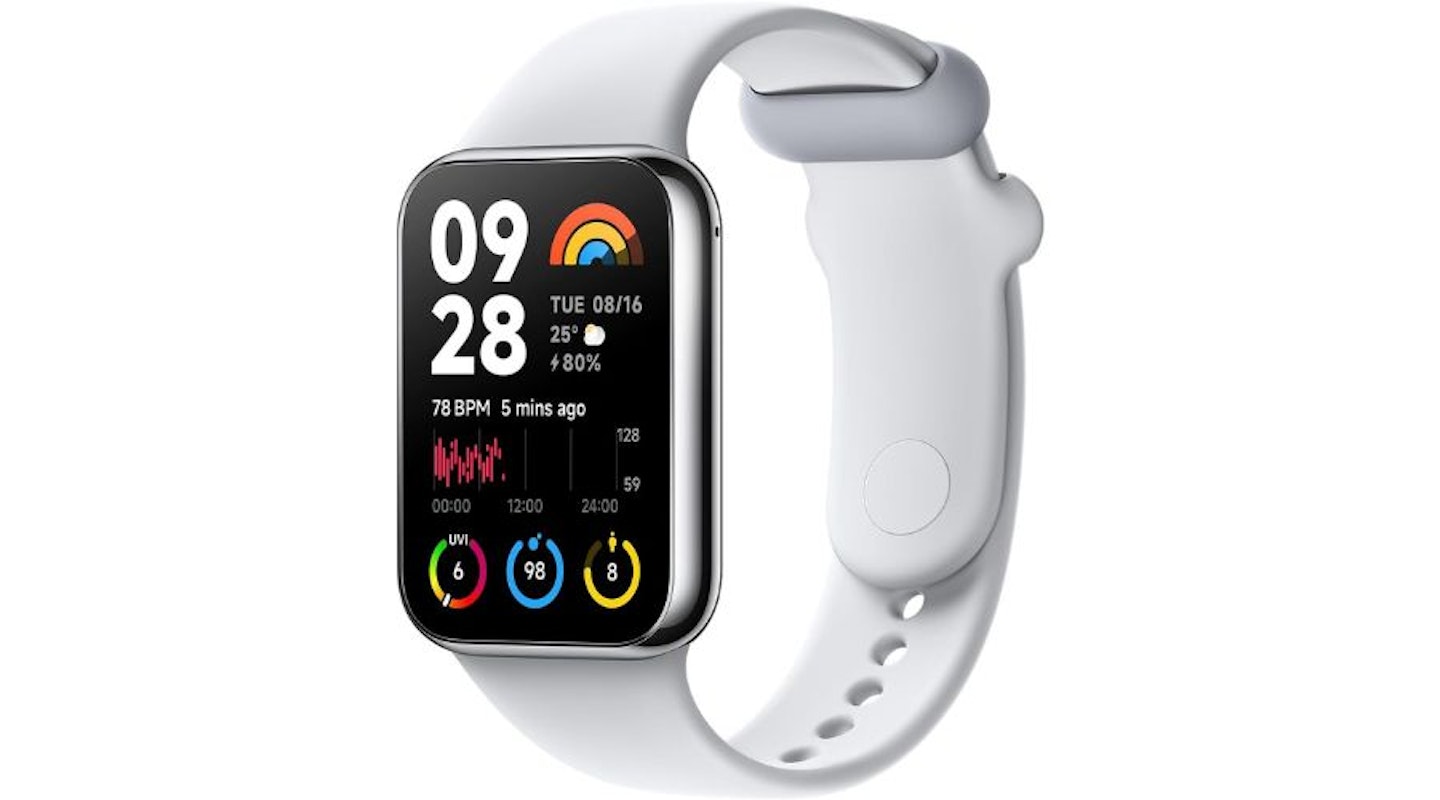 Xiaomi
XiaomiIf you’re interested in tracking your runs, walks and bike rides, but you want to keep your costs down, our top budget pick is the Xiaomi Smart Band 8 Pro. Released in early 2024, it offers an awful lot for a seriously impressive price – its RRP is just £59.99, and honestly? You’ll struggle to find many devices with built-in GPS for under £100.
It’s a comprehensive set of GNSS systems – BeiDou, GPS, GLONASS, Galileo and QZSS – helping to make this as accurate as possible. And while this is undoubtedly a fitness tracker, rather than a smartwatch, a large AMOLED screen makes it easy to track your progress as you go. You’ll also get heart rate, blood oxygen, stress and sleep tracking, alongside step counting and calorie burn estimates. It even claims to track over 150 different sports, including (for some reason) eSports. We’re slightly sceptical of how well it can do this, but at this price, it isn’t a deal breaker.
Now, while we’ve extolled the virtues of this device and its price, there are some compromises. The companion app – Mi Fitness – is pretty basic. You won’t get much in the way of actionable insights and support. There are also some question marks over how well it tracks many of those common health metrics, such as sleep and heart rate. But that’s probably to be expected when it’s so inexpensive.
Pros
- Built-in GPS at this price point is extremely unusual
- Beautiful AMOLED display is bright and clear
- Plenty of other health and fitness tools
Cons
- Mi fitness app is pretty disappointing
- GPS is not multi-band
| Display | 1.74-in AMOLED, 336 x 480 pixels |
| Battery Life | 14 days |
| GPS | BeiDou, GPS, GLONASS, Galileo, QZSS |
| Compatibility | iOS and Android |
| Water Resistance | 5 ATM |
| Dimensions | 48 x 22.5 x 10.99 mm |
| Weight | 22.5 grams |
Best Garmin fitness tracker with GPS
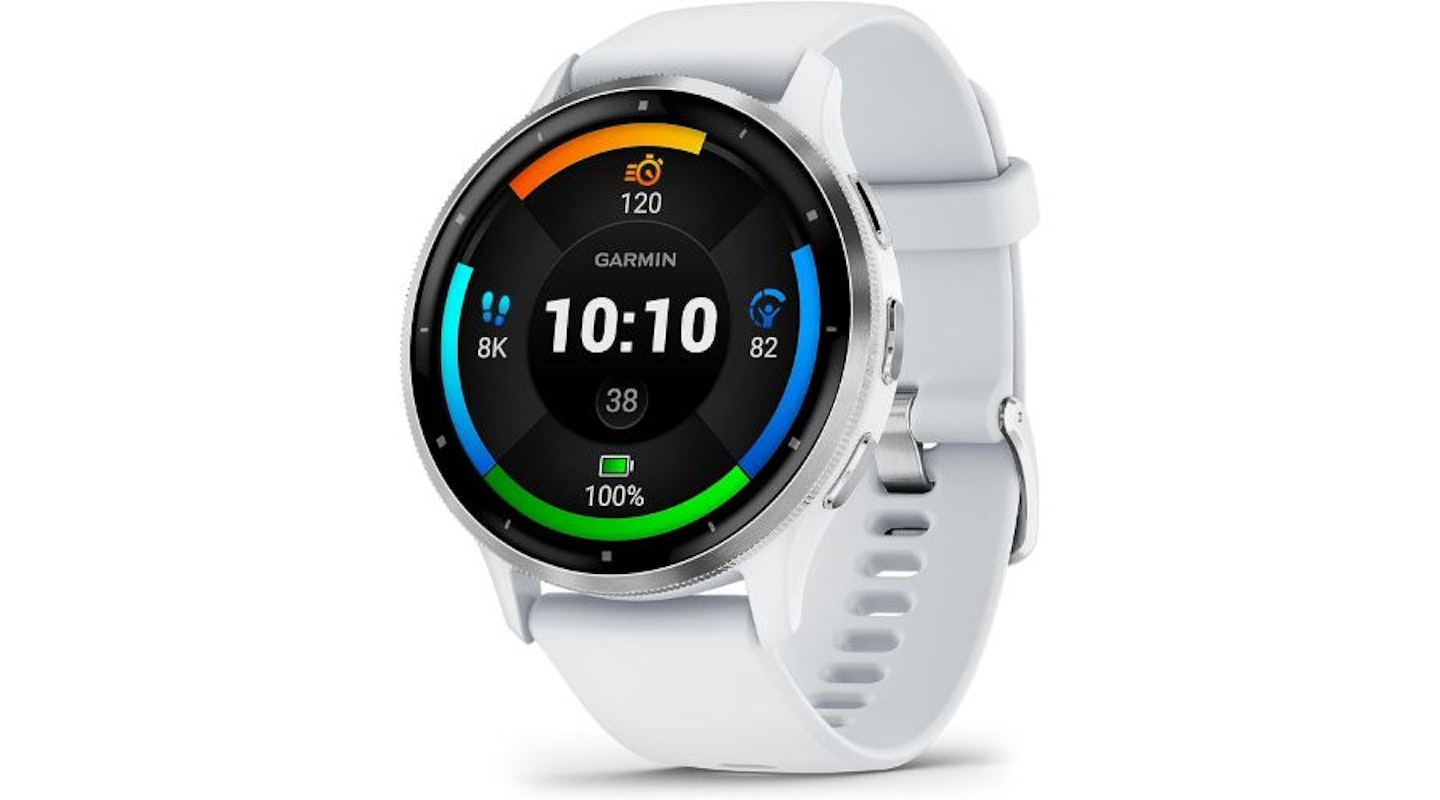 Garmin
GarminEven someone who is just dipping their toe into fitness tracking will have heard of Garmin. As the de-facto leader when it comes to advanced sensor and GPS technologies, the company have consistently delivered on their promises. The Venu Sq Music Edition is a rather special little gadget, as the list of tracked metrics is super-impressive. Here we have respiration, steps and calories, distance, intensity minutes; stress, menstruation cycle, hydration, and sleep. If there's a tracker here that is suitable for most activities - even golfing - this is it.
It also comes with TrueUp - a feature that allows you to wear and sync data collected from multiple activity trackers if you have them. Move IQ is another cutting-edge feature, as it can intelligently detect what exercise you're doing based on your movements. Once you're done working out, the Garmin Connect app can use that data to identify familiar exercising patterns - even as selective as using an elliptical machine - and tag them. The training, planning and analysis features here are quite impressive. Garmin Coach will join you on your wrist to keep you on track too. Added smartwatch goodies include Garmin P for contactless payments, and customisations and apps via the Connect IQ store.
Last but certainly not least is the fact that this is the Music Edition of the Garmin Venu Sq. There's enough internal storage space to leave your phone at home. Download your favourite music and playlists right onto your watch. Genius.
Pros
- Impressive range of tracking functions
- Built-in mic and speaker for taking calls
- Garmin Coach is excellent for motivation
Cons
- Doesn't offer multi-band GNSS or SatIQ
- Limited app store means this isn't a "true" smartwatch
| Display | 1.4-inch AMOLED, 454 x 454 pixels |
| Battery Life | Up to 14 days |
| GPS | GPS, GLONASS, Galileo |
| Compatibility | iOS and Android |
| Water Resistance | 5 ATM |
| Dimensions | 45 x 45 x 12 mm |
| Weight | 46 grams |
Best Fitbit fitness tracker with GPS
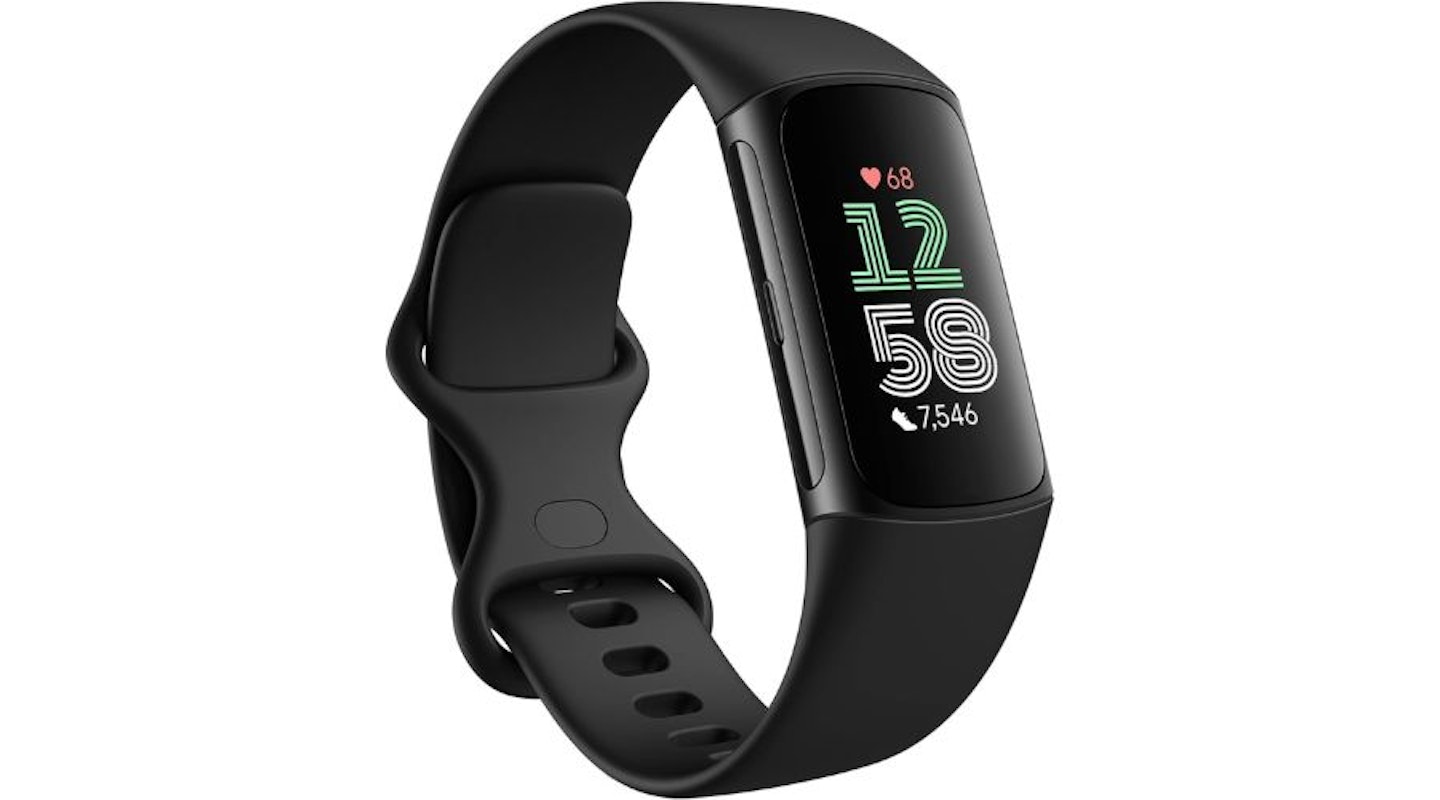 Fitbit
FitbitFitbit's newest version in the Charge range, the Charge 6 is the best fitness tracker from the brand so far. It offers lots of features you’d usually expect to find in more expensive devices, such as built-in GPS and ECG (electrocardiogram) functions. And it still manages to put all this in a package that shouldn’t cost you more than £140 (and we have seen it on offer for less than £120).
The Charge 6 uses GPS and GLONASS systems, giving you a good chance of being able to accurately track any outdoor activities you do. There’s also integration with Google Maps which can give you directions on your wrist – particularly handy if you are somewhere new and aren’t sure where you’re going. It’s also one of the smallest devices on our shortlist, so if you prefer a lozenge-shaped fitness tracker to a more traditional watch design, this could be a good choice for you.
It also features an upgraded PPG sensor, to provide the most accurate heart rate and blood oxygen tracking of any Fitbit. You can also monitor body temperature variations, stress, sleep, and plenty of different types of exercise – over 40, in fact. You can get extra insights into your fitness thanks to the Cardio Fitness and Daily Readiness scores, although you will need a Fitbit Premium subscription to access all your data. Paying extra for this is a big negative, and for some, won’t be worth it. But you do get six months free to try it out.
Pros
- Upgraded heart rate monitoring
- Google Maps support
- ECG app
Cons
- GPS isn't as accurate as the best devices
- Paying to access some metrics is frsutrating
| Display | 1.4-inch AMOLED |
| Battery Life | Up to seven days |
| GPS | GPS, GLONASS |
| Compatibility | iOS and Android |
| Water Resistance | 5 ATM |
| Dimensions | 36.73 x 23.09 x 11.20 mm |
| Weight | 37.64 grams |
There's no doubt that Polar is one of the top brands when it comes to fitness trackers and tracking sensors. The Vantage V3 is a significant step up from earlier versions. Naturally, this will monitor your heart rate, step count, sleep and so on, but it also offers a seriously impressive array of features, with a laser-focus on training and recovery support.
The sizable AMOLED touch screen will help you to track your calories, distance, steps and more. Thankfully, that gorgeous colour screen has toughened Gorilla glass – so it'll look just as great as you'll feel after training.
Senior Writer and Reviewer Steven Shaw recently spent time with the Polar Vantage V3. Here's what he had to say: "Polar has worked hard to make sure the Vantage V3 keeps up with the competition. As a result, there is an abundance of training and recovery features that make this watch suitable for almost any athlete.
"I was really impressed by how well the Vantage V3 performed. Polar has introduced a new 'Elixir' biosensor, and it appears to have made a big impact, compared to the slightly underwhelming performance of the Polar Vantage V2. I felt it performed brilliantly.
"If you're a serious athlete, or a dedicated fitness enthusiast, you'll get plenty from the Polar Vantage V3. The suite of training and recovery metrics is comprehensive and offers far more insight than many more basic fitness trackers. The display is superb, battery life is very respectable, and the app is comprehensive. Simply, it's one of the best devices I've tested, and one of the best fitness watches currently available."
Read the full review.
Pros
- A-GPS helps deliver fast and accurate GPS tracking
- Absolutely stuffed with health and fitness tracking tools
- Navigational support is top-notch
Cons
- Not as water-resistant as its predecessor
- Very few smartwatch features
| Display | 1.39-inch AMOLED, 454 x 454 pixels |
| Battery Life | Up to 10 days |
| GPS | GPS, GLONASS, BeiDou, Galileo, QZSS |
| Compatibility | iOS and Android |
| Water Resistance | WR50 (50 metres) |
| Dimensions | 47.3 x 47.3 x 13.5 mm |
| Weight | 57 grams |
6.
Coros Pace 3
Best mid-range fitness tracker with GPS
 Coros
CorosPound for pound, the Coros Pace 3 is one of the best value devices on our shortlist, offering outstanding GPS tracking and in-depth training features that committed athletes will love. It’s also got an eye-catching price tag of just £219, making it one of the most affordable devices on our shortlist.
The Pace 3 supports multiband GPS, GLONASS, Galileo, BeiDou and QZSS satellite systems, and can connect to all five of these systems at the same time. This allows users to get a solid system in almost any environment and promises to be among the most accurate out there. You can send routes from apps such as Strava to the Coros app, and the watch will then provide turn-by-turn navigation as you go.
Alongside the superb GPS, the Pace 3 has an improved PPG sensor to provide better heart rate, sleep and blood oxygen tracking, while a barometric altimeter can detect your elevation as well. Battery life is also impressive, with 38 hours of continuous use in GPS mode, and 17 days of normal use promised by Coros. Coros also offers plenty of training plans to help support your running.
Design-wise, it’s also incredibly light, which is ideal for long runs. The memory-in-pixel display isn’t as clear or bright as the best AMOLED displays on other devices, but it does help extend that impressive battery life, and is still easy to read. It may not have as many features as some more expensive watches, but this is an excellent running watch at an affordable price.
Pros
- Excellent battery life
- Multi-band GPS support
- Exceptionally good value for money
Cons
- Plastic body isn't as premium as other devices
- MIP display is slightly dull
| Display | 1.2-inch MIP LCD, 240 x 240 pixels |
| Battery Life | Up to 17 days |
| GPS | GPS, GLONASS, Galileo, Beidou, QZSS |
| Compatibility | iOS and Android |
| Water Resistance | 5 ATM |
| Dimensions | 41.9 x 41.9 x 11.7 mm |
| Weight | 39 grams |
Best Apple fitness tracker with GPS
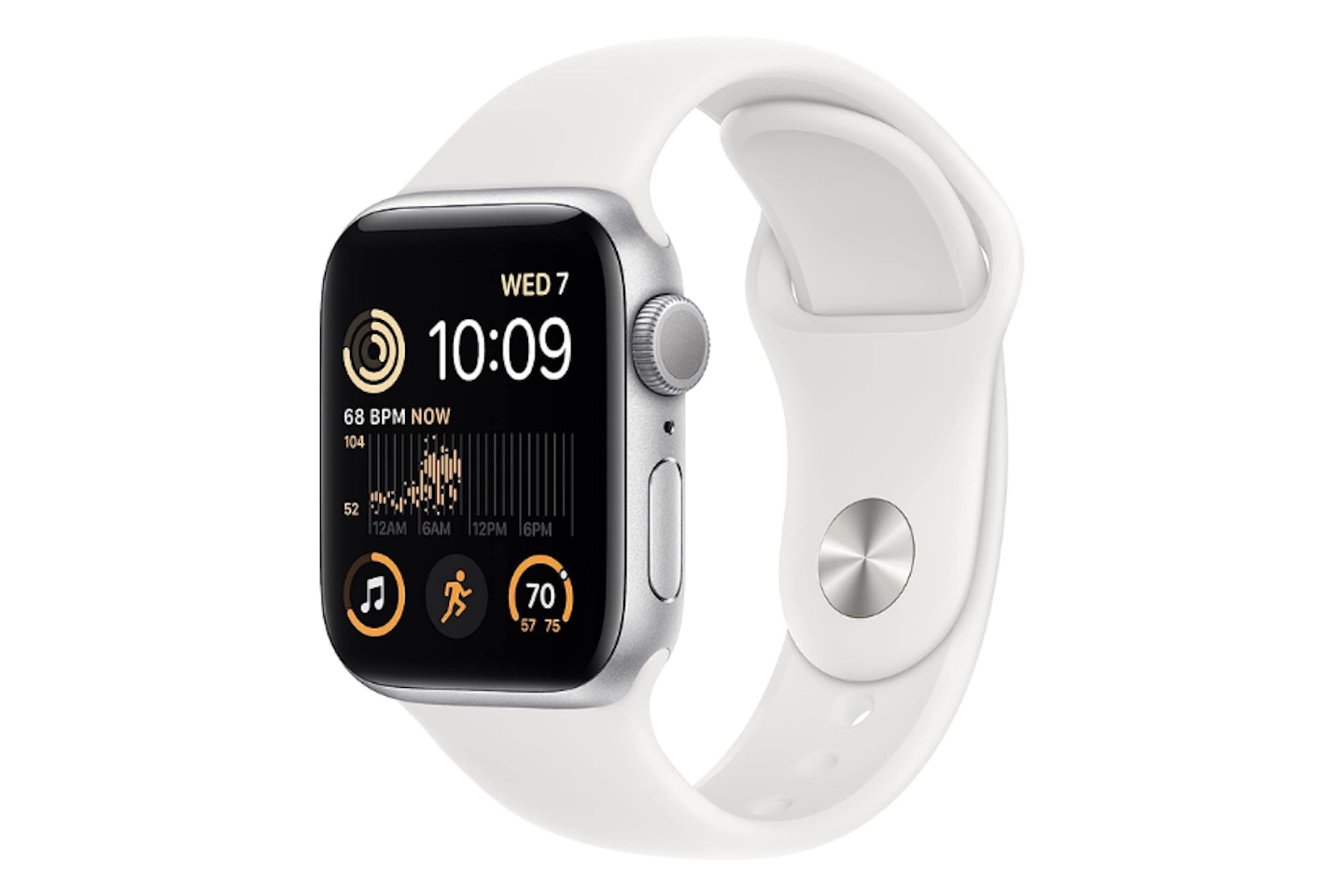
If you’re an iPhone user and want the most integrated smartwatch experience, then an Apple Watch is ideal for you. Of the three current models, our pick is the Apple Watch SE, which offers plenty of features for the most affordable price.
The Apple Watch SE supports GPS, GNSS, QZSS and Galileo systems, giving you a good chance of picking up at least one satellite system when you’re out and about. Unlike many of the devices on this list, it doesn’t support multi-band or dual-frequency GPS. This means that it may not be as accurate in built-up, densely forested, or mountainous areas, for example. But, for most people, it will be good enough to track daily walks, runs and the like. And crucially, its RRP from £219 makes it far cheaper than the Apple Watch Ultra 2 (RRP from £799) - the only current Apple watch that does support dual-frequency GPS.
Aside from the GPS, the Apple Watch SE offers loads of health and fitness tracking features, including heart rate, sleep, and activity metrics. It’s one of the most user-friendly smartwatches around and integrates seamlessly into the rest of the Apple ecosystem. Yes, there are compromises in performance. But the balance between features and cost makes this the best Apple Watch with GPS for most people.
Pros
- Sleep Apple build and design
- Great safety features
- Reliable GPS
- Lots of storage space for music and apps
- Enhanced Workout app for intelligent use of data
- Fitness App compatible
- WiFi and many functions beyond fitness
Cons
- Battery life is so-so (but only because it's one of the most capable smartwatches too)
- Fewer health tracking features than other devices
- Doesn't support dual-band GPS
| Display | 1.78-inch OLED Retina display, 448 x 368 pixels |
| Battery Life | Up to 18 hours |
| GPS | L1 GPS, GLONASS, Galileo, and QZSS |
| Compatibility | iOS only |
| Water Resistance | 50 metres under ISO standard 22810:2010 |
| Dimensions | 40 x 34 x 10.7 mm (small), 44 x 38 x 10.7 mm (large) |
| Weight | 27.8 grams (small), 33 grams (large) |
If you love the great outdoors, then a watch that can cope with all your adventurers is important. The Coros Vertix 2S is the brand's flagship adventure watch, with a rugged design built to cope with almost anything you might throw at it. With a titanium bezel, scratch resistant sapphire glass display, and incredible battery life of up to 40 days, it really is built to go a long way off the beaten track.
A big part of this is the improved GPS antenna. The watch supports dual-frequency multi-band GNSS, so wherever you are in the world, it stands a good chance of being able to quickly and accurately pinpoint your location. The watch can link up with all five major satellite networks – GPS, GLONASS, Galileo, QZSS, and BeiDou. The large display is great for navigation, and you can also create routes and download them onto the watch.
Steven Shaw tested this watch for What's The Best. In his review, he wrote: "This is the best watch Coros currently offers. It covers all the essentials I'd expect to see in a good sports watch. It's highly accurate, consistent, and comfortable.
"While the Vertix 2S isn't the cheapest among its peers, I still consider it fair value. You get an excellent watch that's built for the outdoors, with lots of metrics for tracking your health and fitness.
"I really enjoyed wearing this watch, although I personally prefer something a little smaller on my wrist. The Vertix 2S won't appeal to everyone. But for adventurous types, there really is a lot to like."
Pros
- Superb battery life
- Extremely accurate multi-band GPS
- Lots of health and fitness metrics
Cons
- MIP display is quite dull compared to AMOLED screens
- It's really big
- Limited smartwatch functions
| Display | 1.4-inch transflective memory-in-pixel, 280 x 280 pixels |
| Battery Life | Up to 40 days |
| GPS | GPS, GLONASS, GALILEO, Beidou, QZSS |
| Compatibility | iOS and Android |
| Water Resistance | 10 ATM |
| Dimensions | 50.3 x 50.3 x 16 mm |
| Weight | 87 grams (with silicone band) 70 grams (with nylon band) |
Google's Pixel Watch 2 is a beautiful combination of glass and aluminium, which looks and feels incredibly premium. It’s incredibly light, and the AMOLED display is stunning. If you want a watch that looks great, this is right up there. As well as being easy on the eye, it’s also got plenty of impressive specs to back it up, as we found when we reviewed the product.
GPS, GLONASS, Galileo, QZSS and BeiDou are all supported by the Pixel Watch 2, and the watch connects to GPS incredibly quickly when preparing to use it. Even in built up areas such as a city, you can expect to accurately track whatever route you take. It isn’t, however, the multi-band support you get on some other devices.
As you'd probably expect, the Pixel watch 2 also tracks heart rate, stress, sleep and blood oxygen metrics, while Pace and Heart Zone Training tools support you in trying to smash a PB. There's also an ECG app to let you check for signs of atrial fibrillation, a common form of irregular heart rhythm.
Overall, you're getting a smartwatch that offers a brilliant combination of style and substance, and the RRP from £349 isn't overpriced either (we've even seen it for under £300). It won't work with an iPhone though, so this one is solely for Android phone users.
Pros
- Beautiful design
- Connects to GPS quickly
- Improved charging speed
Cons
- No multi-band support
- Short battery life compared to alternatives
| Display | 1.2-inch AMOLED, 450 x 450 pixels |
| Battery Life | Up to 24 hours |
| GPS | GPS, GLONASS, BeiDou, Galileo, QZSS |
| Compatibility | Android only |
| Water Resistance | 5 ATM |
| Dimensions | 41 x 12.3 mm |
| Weight | 31 grams |
Best Huawei fitness tracker with GPS
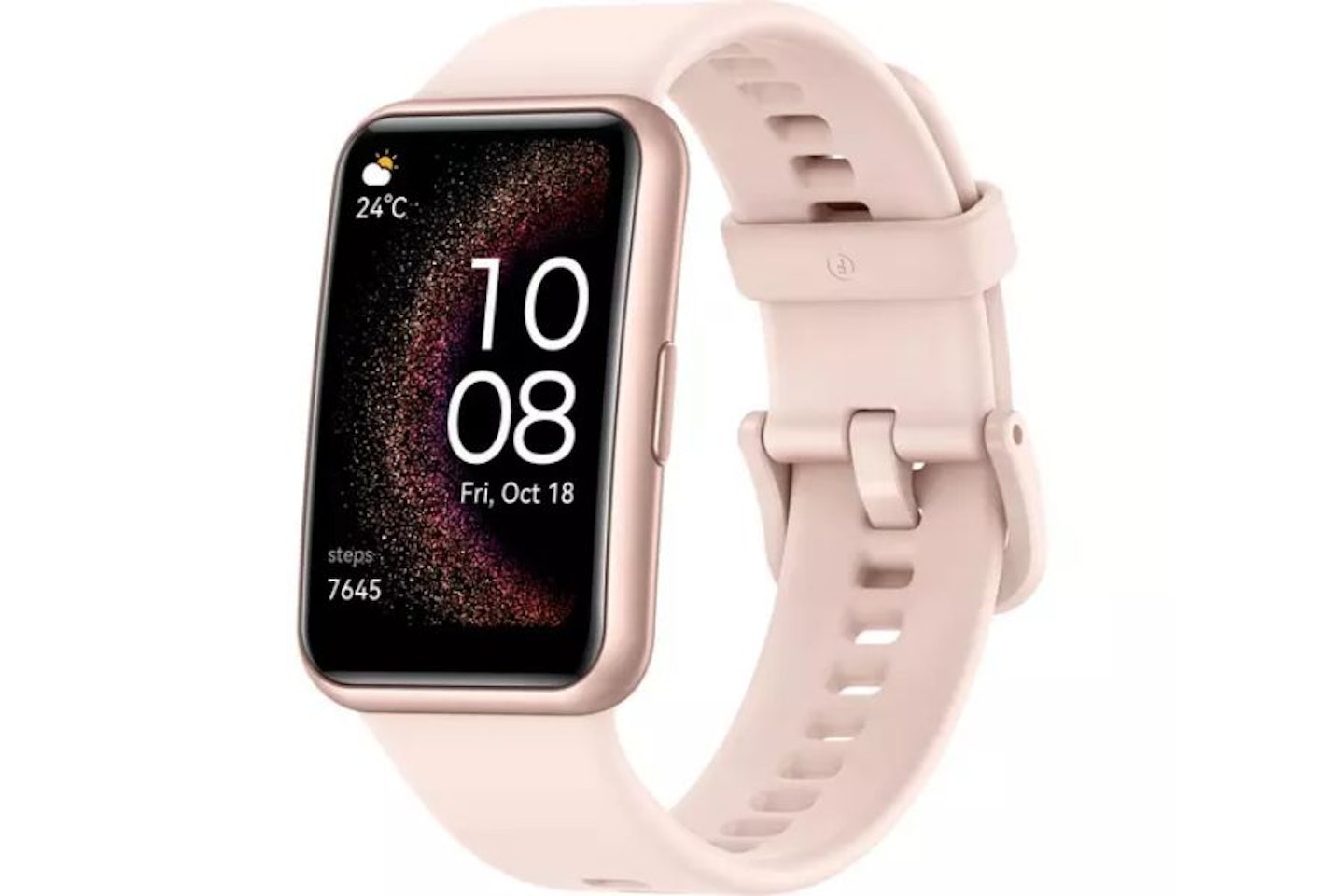
With an RRP from £139.99, the Huawei watch Fit 3 is one of the cheapest devices on our shortlist, but still offers plenty of health and fitness tracking features, as well as built-in GPS. This watch supports single-band, five-system GNSS – which means it can connect to GPS, GLONASS, Galileo, BeiDou and QZSS, but only one at a time. This means it will be less precise than the best devices, but for many, it will be correct enough to track walks, runs and bike rides.
It's compatible with both Android (although due to Huawei’s ban from the Play Store, you’ll need to sideload the app) and iOS devices, and it offers lots of smartwatch features, including on-wrist phone calls, standalone music playback, and a remote shutter function to let you use your phone camera from your wrist. Battery life is also very respectable compared with many smartwatches, with up to 10 days between charges promised by Huawei.
As the name suggests, it's very much designed to support your health and fitness goals. Huawei claims the Watch Fit 3 can track over 100 different activity types, while heart rate, blood oxygen, sleep and menstrual cycle tracking are all available. There are also guided animations, a race pace setter, calorie tracking and nutritional analysis, and – if you’re a fan of the activity rings on an Apple Watch – Huawei has introduced something eerily similar.
The RRP of £139.99 makes this a more affordable alternative than many other smartwatches, and while the GPS isn't the absolute best out there, it will do the job for any casual exerciser.
Pros
- Very good 10-day battery life
- Over 100 workout modes
- TruSeen 5.5 tracks your heart rate 24/7
- Huge 1.82-inch AMOLED display
Cons
- Only single-band GPS support
- Android users can't install the app from the Google Play Store
| Display | 1.82 inch AMOLED, 480 x 480 pixels |
| Battery Life | Up to 10 days |
| GPS | GPS, GLONASS, BeiDou, Galileo, QZSS |
| Compatibility | iOS and Android |
| Water Resistance | 5 ATM |
| Dimensions | 43.2 × 36.3 × 9.9 mm |
| Weight | 26 grams |
Last, but by no means least on our list, is the Garmin Forerunner 255. If you're looking for an affordable Garmin device that still packs plenty of the excellent features Garmin is known for, this is the device we'd recommend. It’s almost identical to the Forerunner 265 which tops our list, although it lacks the beautiful AMOLED display of the newer device. Instead, it has a memory-in-pixel display that's good, but just not as good as AMOLED.
If that doesn't bother you, then you're getting an excellent watch at a much more affordable price – the RRP is £299.99, but we've regularly seen it on offer for much less than this. And it still offers the same superb GPS tracking as most other Garmin devices. Multi-band GNSS support is available for GPS, GLONASS and Galileo, while SatIQ helps keep the signal as strong as possible.
You'll also get all the usual health and fitness tracking features you’d expect, including heart rate, sleep, blood oxygen and stress tracking, as well as Garmin's excellent Body Battery Fitness Age, and VO2 Max measurements. It’s a great package, and if you don’t necessarily need the newest watch in the range, it will still do a fantastic job at tracking your whereabouts.
Pros
- Multi-band GPS support
- Lots of health and fitness tools
- Excellent value when it's on special offer
Cons
- MIP screen isn't as bright as AMOLED rivals
| Display | 1.3-inch transflective memory-in-pixel, 260 x 260 pixels |
| Battery Life | Up to 14 days |
| GPS | GPS, GLONASS, GALILEO |
| Compatibility | iOS and Android |
| Water Resistance | 5 ATM |
| Dimensions | 45.6 x 45.6 x 12.9 (mm) |
| Weight | 49 grams |
Buyer's Guide: the best fitness tracker with GPS of 2024
This is where you get to really consider your options before you buy. Although we do have a budget option in our list of recommended trackers, they're generally not the cheapest items, so it'll pay to spend some time examining your use case before you buy. Here are some pointers:
Consider your range of sporting or other activities
Not all of the best fitness trackers with GPS are born equal. Just because the model you’ve settled on has GPS doesn’t mean it does everything. If you’re used to wearing a watch for running you might be looking at heart rate more than calories burned. If you’re a walker, you might prefer a more accurate step measurement or even a blood pressure monitor built in if you’re walking for therapeutic reasons.
Whatever you need it for, spend a little time considering which data you need the most, then choose a tracker that has the appropriate sensors inside. Be advised though, not all models can actually use GPS tracking unless they’re paired with a smartphone with internet access. A companion app is often used to feed the fitness tracker with data and record the stats as they’re returned. If you dislike having to carry more than one device, look for a model that has full GPS capability on board, which also means your data is stored on the tracker for access later.
Water and dustproofing
This, again, relates to how and where you’re planning on using your fitness tracker. Water resistance and waterproofing are not the same, so you should pay special attention to the IPX rating of your new device.
IPX is an international standard that covers waterproofing, water resistance and even dust. Water resistance is rated between IPX3 and IPX7. You’ll commonly find this on trackers that can withstand sweat, splashes of rain, and a very short time submerged; but nothing much more than that. IPX7, IPX8 and above have a waterproof rating. This means that fitness trackers with that rating will be able to handle submersion, but depths and times will vary.
Size, weight and fit
The last thing a runner needs is an insecure strap on a fitness tracker that’s a little on the bulky side. If you’re the sort of person who finds wearing gadgets irritating, you’ll need to make sure the strap will cater for your wrist size and is made of a material - such as silicone - for maximum comfort.
Also, as smartwatches like the Apple Watch do tend to be larger and heavier than the likes of their Fitbit tracker cousins, only go for a smartwatch for your tracking if you know it’s not going to be cumbersome. And don’t forget, these are expensive items as gadgets go. So, if your sport means it’s likely to be dropped, scuffed or exposed to the elements, buy wisely.
Are you buying for a child? Much of the time the straps on an adult fitness tracker will be too large. Not to mention they’re not designed to inspire kids. We have a great selection of fitness trackers for children here - including some with GPS.
Accessing your stats
The best fitness tracker with GPS will give you instant access to top-line stats on their built-in screens. But there's only so much you can do with it while you’re wearing it. If you’re looking to use the GPS data to integrate with route-mapping apps, not to mention charting your data, you’ll need to get the data off the tracker and onto your phone, tablet or PC.
Not even the best fitness trackers with GPS are compatible with every other device known to man, so consider how and where you’re planning to use your data. The choice is yours.
Get charged-up
The last thing you need halfway through your route is to realise you're out of juice – and we don’t mean the orange variety. Look carefully at the stated battery life of your chosen tracker. Only you will know how long your routine takes you, so plan your choice around the longevity of the battery on one full charge.
Charging is another hot – topic with fitness trackers, as being able to charge up quickly while you’re out and about can be essential. Some have higher-wattage wireless fast chargers that will make quick work of it. Others need longer and only use a standard USB cable.
Spares
Whether you like to customise your Fitbit straps or replace them, it's important to take wear and tear into account. Silicone straps may be comfortable, but they’re also prone to damage. You may want to check to see if your brand of fitness tracker has good spares availability.

FAQ: the best fitness tracker with GPS of 2024
Do I really need GPS on my fitness tracker?
If your passion is getting out and about as you exercise, there’s nothing better than knowing where you’ve been. Not only can you discover new routes and repeat them in detail but you can also track your previous performance; and in a way that means something to you. This can prove to be highly motivational.
The very best fitness trackers with GPS have a multitude of other functionalities too, of course. They can keep track of your pace, guide you to stay on the right route, distance tracking, and more. Without a GPS to map your journey, all you have is plain old data. Interesting for spreadsheet nerds, but nothing beats seeing where you've been on a map for that sense of achievement.
What’s the difference between single-band, dual band, and multi-band systems?
In simple terms, the more frequency bands a fitness tracker uses, the more accurate positioning is likely to be. Single-band devices can only connect to one frequency band at a time, while dual-band and multi-band devices can connect to more than one frequency at once.
Multi-band devices can connect to the GNSS system more quickly, tend to be more reliable, and deliver more accurate location data. This is especially true in difficult environments, such as mountainous, heavily forested, or even urban settings where you're surrounded by skyscrapers. It’s worth pointing out that in wide open spaces, single-band GNSS can still be highly accurate, so if you aren’t in those more difficult environments, these devices will still be fine for you to use.
Are fitness trackers worth it?
This is really several questions in one. Once you've set your budget, you should be able to find a fitness tracker that has GPS. How much you pay is down to you, and also down to how much value you place on your fitness routine. Given the motivational benefits of GPS trackers alone, let alone the fun value, we think they're an invaluable addition to your exercise time.
But, are they worth it when it comes to fitness? Well, this is all down to you – you can use the best fitness tracker with GPS as little or as much as you like. You can simply marvel at the map of your route with associated stats and share it on your socials, or you can do a deep dive into the tracking data and attack your PBs. It's up to you how much actual fitness value you squeeze out of it.
What's the best fitness tracker for accuracy?
There are pros and cons with all brands, and the best fitness trackers with GPS are no exception. Of the major, trusted brands we’ve featured here, there is no clear leader for accuracy. Although, for GPS, Garmin built its brand as a satellite navigation company, so it already has an exceptional track record. For heart rate data, we're big fans of the Polar Vantage V3, given Polar’s history of heart-rate tracking equipment.
Will fitness trackers work with an iPhone or Samsung?
Yes. But not universally. If you’re a dedicated Samsung user rather than Apple, or vice versa, you’ll find options to suit your needs. As we mentioned in our article on fitness trackers for Android, there’s a great deal of choice when it comes to trackers that work with this OS. Alternatively, Garmin fitness trackers work with both iPhone and Android devices, so if you’re looking to keep things flexible this is a go-to option.
Are fitness trackers accurate for calories burned?
This is a complex question that very much depends on the model you choose and the sensors it has. For more information on this, take a look at our article on counting calories using fitness trackers.
Summary: the best fitness tracker with GPS of 2024
GPS comes into its own for anyone who wants to track their activity in the great outdoors – runners, walkers, cyclists and triathletes are good examples of sportspeople who will particularly benefit. If you’re a gym bunny, there’s far less need for GPS. Instead, you should consider other health and fitness tracking features on your fitness tracker as your priority.
As we mentioned earlier, GPS isn't the same in every fitness tracker. The best devices will offer dual-band or multi-band GNSS. The drawback is that these devices can often be slightly more expensive than those that rely on single-band GPS.
If it’s something you’re going to use regularly, then we’d say spending a bit extra for more reliable GPS is worth it. If you’re going to use GPS more occasionally, then you’ll probably be fine with a cheaper model that doesn’t rely on multi-band connectivity, even if it may be slightly less accurate.
How we chose:
When creating our shortlist, we first looked for devices that have built-in GPS. Once we'd found relevant fitness trackers, we then considered how many GNSS systems they can communicate with, whether they are single-band, dual-band or multi-band, and how accurate they are likely to be as a result. We also considered other features that each of these devices offers. Finally, we looked at how much they cost, and looked for devices that we felt represented good value as a whole package.
Steven Shaw is a Senior Tech Writer and Reviewer for What’s the Best. Steven writes how-to guides, explainers, reviews and best-of listicles covering a wide range of topics. He has several years of experience writing about fitness tech, mobile phones, and gaming.
When Steven isn’t writing, he’s probably testing a new smartwatch or fitness tracker, putting it through its paces with a variety of strength training, HIIT, or yoga. He also loves putting on a podcast and going for a long walk.
Subscribe to the What’s The Best Newsletterto keep up to date with more of the latest reviews and recommendations from the What’s The Best team.


